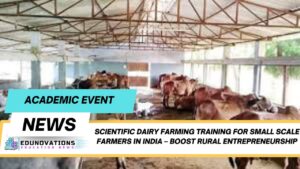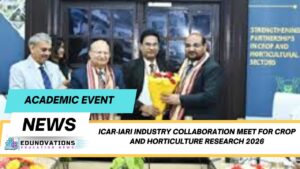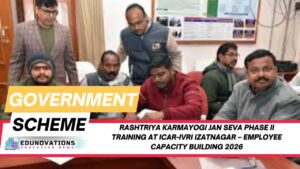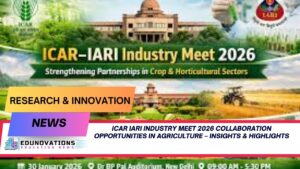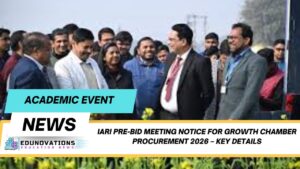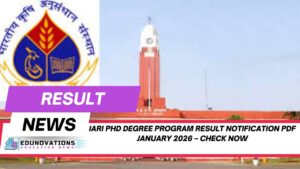Discover how rice-based integrated farming systems training in Assam by IARI-Assam is revolutionizing agriculture, empowering farmers, and boosting food security.
Introduction
Agriculture in India is undergoing a remarkable transformation, and the latest initiative by the Indian Agricultural Research Institute (IARI-Assam) is a shining example of this shift. With the formal takeover of the Regional Rainfed Lowland Rice Research Station (RRLRRS) at Gerua, Assam, previously managed by CRRI-Cuttack, a new era of innovation and sustainability has begun. To mark this transition, IARI-Assam organized an awareness-cum-training programme that focused on empowering farmers with advanced knowledge on rice-based integrated farming systems training in Assam.
This milestone is not just about research infrastructure; it is a significant step toward building farmer capacity, enhancing productivity, and ensuring sustainable livelihoods across the northeastern region.
Background of the Initiative
The CRRI-Cuttack had long been associated with cutting-edge rice research in India. With the station at Gerua now under IARI-Assam’s management, the focus has shifted to contextualized farming practices that address the unique challenges faced by farmers in Assam’s flood-prone and rainfed lowland areas.
By introducing rice innovation and crop diversification for Northeast farmers, this program intends to make local agricultural systems more resilient, productive, and profitable.
The Training Programme: A Turning Point
The awareness-cum-training programme was designed to serve as a bridge between agricultural research and rural application. Farmers from districts such as Nalbari, Baksa, and Kamrup actively participated, gaining hands-on exposure to sustainable rice-based practices.
The focus was on:
- Efficient use of resources in paddy cultivation
- Diversification of crops for income stability
- Integration of livestock and horticulture with rice systems
- Adoption of climate-smart farming practices
- Knowledge transfer through interactive demonstrations
Such awareness-cum-training for paddy sustainable farming in Assam offers farmers practical solutions rather than abstract theories, enabling them to replicate these practices in their villages.
Expert Insights and Perspectives
Dr. A.K. Singh, former Deputy Director General (ICAR-Crop Science), has often emphasized that integrated farming systems are the future of Indian agriculture. He noted, “By combining rice cultivation with allied sectors like livestock, aquaculture, and horticulture, we not only enhance productivity but also mitigate risks associated with climate variability.”
This resonates with the IARI-Assam takeover RRLRRS Gerua for farmer empowerment, where the institute aims to transform agricultural knowledge into accessible, localized solutions.
Why Integrated Farming Systems Matter in Assam
Assam’s farmers face multiple challenges:
- Flooding and waterlogging in lowland areas
- Fragmented landholdings
- Limited access to modern technology
- Economic instability due to reliance on single-crop systems
The ICAR-IARI rice integrated farming research in Assam regions addresses these problems by creating multi-enterprise systems. For instance, a farmer cultivating paddy can integrate fish farming, vegetable cultivation, and poultry into the same ecosystem, leading to:
- Higher income per hectare
- Better nutritional security for families
- Efficient recycling of farm waste
- Reduced vulnerability to market and climate shocks
Regional Impact and Farmer Response
Farmers who attended the programme expressed optimism about these changes. One participant from Baksa district said, “This is the first time we have seen research institutions actively showing us how to combine rice with livestock and horticulture. It gives us hope for a better future.”
Such responses underline the transformative power of rice innovation and crop diversification for Northeast farmers.
Toppers Use Mind Maps to score more than 95%
NCERT Class 11th Commerce Mind Maps
Add to cartOriginal price was: ₹999.00.₹199.00Current price is: ₹199.00.NCERT Class 12th Chemistry Mind Maps
Add to cartOriginal price was: ₹199.00.₹75.00Current price is: ₹75.00.NCERT Class 12th Commerce Mind Maps
Add to cartOriginal price was: ₹999.00.₹199.00Current price is: ₹199.00.NCERT Class 12th Science Mind Maps
Add to cartOriginal price was: ₹999.00.₹199.00Current price is: ₹199.00.NCERT Mind Maps For Class 10th
Add to cartOriginal price was: ₹999.00.₹199.00Current price is: ₹199.00.
Purchase Today
Broader National and Global Relevance
India has committed itself to sustainable development goals (SDGs), particularly zero hunger and climate action. Initiatives like this support both. Moreover, the Food and Agriculture Organization (FAO) has consistently advocated for integrated farming as a pathway toward resilient agricultural systems worldwide.
Thus, the Gerua programme aligns not only with local needs but also with national policy frameworks and international agricultural best practices.
Educational Value for Students and Researchers
For students preparing for competitive exams, understanding such agricultural initiatives is vital. Platforms like:
can provide valuable resources to connect classroom knowledge with real-world agricultural policies.
For schools looking to integrate such case studies into digital platforms, Mart Ind Infotech offers solutions for setting up education-oriented websites.
Future Pathways
The road ahead for IARI-Assam includes:
- Expanding training programmes to more districts in the northeast.
- Developing model villages showcasing integrated farming systems.
- Creating collaborative networks among farmers, researchers, and local governments.
- Publishing research findings to guide policymakers and academic institutions.
This forward-looking approach cements the role of rice-based integrated farming systems training in Assam as a cornerstone for agricultural resilience.
Conclusion
The takeover of RRLRRS Gerua by IARI-Assam is more than an administrative handover—it is a vision for sustainable agriculture in Assam. Through awareness-cum-training, the institute has empowered farmers with tools to enhance productivity, diversify income, and safeguard against uncertainties.
By combining scientific research with farmer-oriented training, India is strengthening its agricultural backbone while setting an example for the world. The emphasis on rice-based integrated farming systems training in Assam is not just a project; it is a promise of empowerment, sustainability, and long-term food security.
FAQs
Q1. What is rice-based integrated farming systems training in Assam?
It is a programme by IARI-Assam that trains farmers to integrate rice cultivation with livestock, horticulture, and aquaculture for sustainable farming.
Q2. Who conducted the awareness-cum-training for paddy sustainable farming in Assam?
The training was conducted by IARI-Assam at RRLRRS Gerua after its takeover from CRRI-Cuttack.
Q3. Which districts participated in the training programme?
Farmers from Nalbari, Baksa, and Kamrup districts were among the active participants.
Q4. Why is the IARI Assam takeover RRLRRS Gerua for farmer empowerment important?
It ensures localized research and tailored solutions for Assam’s unique lowland rice farming challenges.
Q5. How does rice innovation and crop diversification for Northeast farmers help?
It reduces dependency on single crops, increases income, and enhances food and nutritional security.
Q6. What role does ICAR-IARI rice integrated farming research in Assam regions play?
It develops farming models that combine rice with other enterprises to optimize resources and boost profitability.
Q7. Are integrated farming systems climate-resilient?
Yes, they provide stability against floods, droughts, and market fluctuations by diversifying income sources.
Q8. How can students learn more about such initiatives?
They can explore Current Affairs and Notes platforms for academic resources.
Q9. What benefits did farmers highlight during the programme?
Farmers appreciated practical demonstrations showing how rice farming could be integrated with livestock and horticulture.
Q10. How does this initiative support India’s national goals?
It aligns with SDGs like zero hunger and climate action, while strengthening local food security in Assam.








